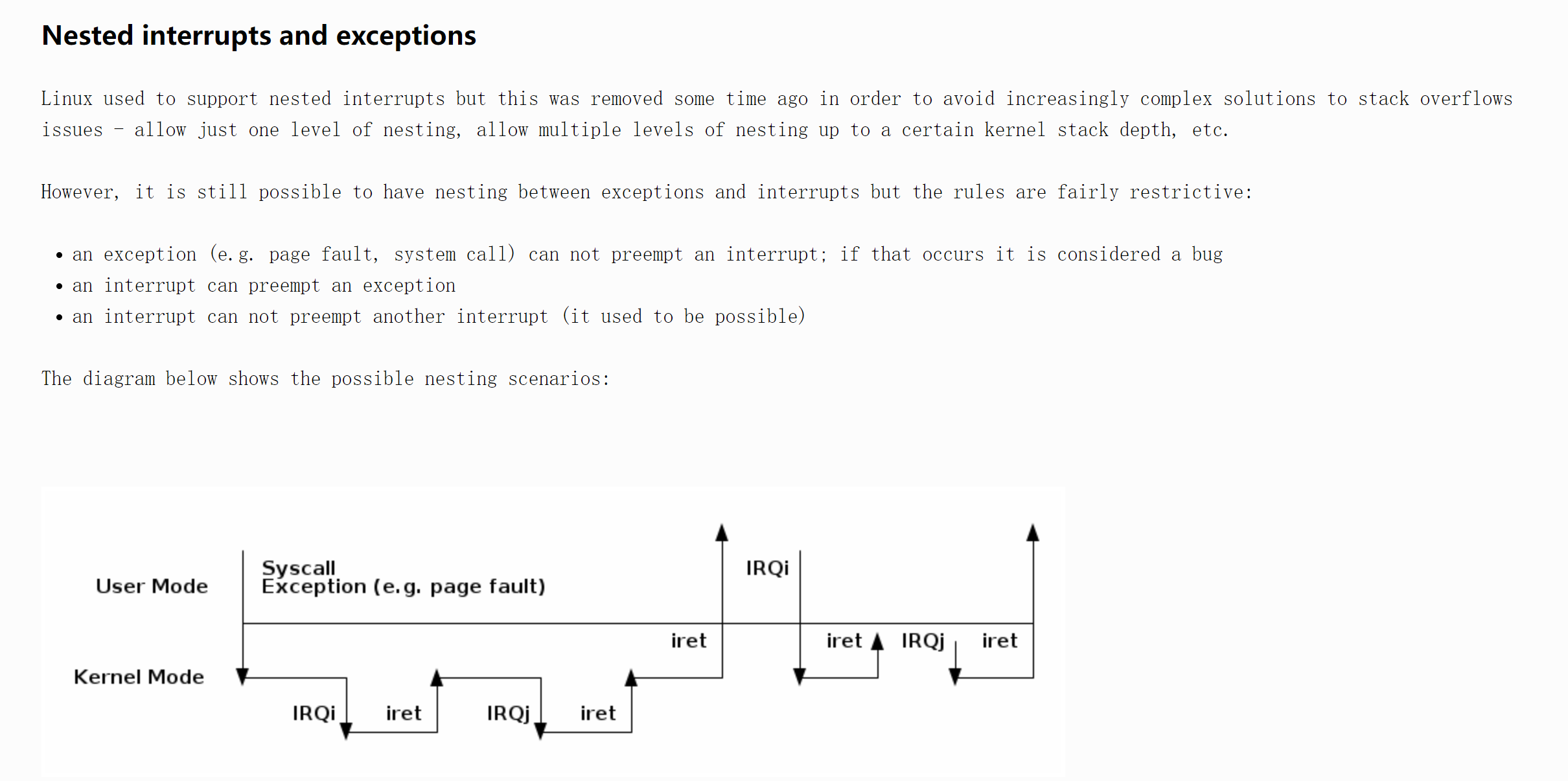LDD3 学习笔记
LDD3 WEEK4
代码补充
环境
Linux rogerthat 5.19.0-46-generic #47-Ubuntu SMP PREEMPT_DYNAMIC Fri Jun 16 13:30:11 UTC 2023 x86_64 x86_64 x86_64 GNU/Linux第五章
complete
轻量级的一种同步机制
#include <linux/module.h>
#include <linux/init.h>
#include <linux/sched.h> /* current and everything */
#include <linux/kernel.h> /* printk() */
#include <linux/fs.h> /* everything... */
#include <linux/types.h> /* size_t */
#include <linux/completion.h>
MODULE_LICENSE("Dual BSD/GPL");
static int complete_major = 0;
DECLARE_COMPLETION(comp);
ssize_t complete_read (struct file *filp, char __user *buf, size_t count, loff_t *pos)
{
printk(KERN_DEBUG "process %i (%s) going to sleep\n",
current->pid, current->comm);
wait_for_completion(&comp);
printk(KERN_DEBUG "awoken %i (%s)\n", current->pid, current->comm);
return 0; /* EOF */
}
ssize_t complete_write (struct file *filp, const char __user *buf, size_t count,
loff_t *pos)
{
printk(KERN_DEBUG "process %i (%s) awakening the readers...\n",
current->pid, current->comm);
complete(&comp);
return count; /* succeed, to avoid retrial */
}
struct file_operations complete_fops = {
.owner = THIS_MODULE,
.read = complete_read,
.write = complete_write,
};
int complete_init(void)
{
int result;
/*
* Register your major, and accept a dynamic number
*/
result = register_chrdev(complete_major, "complete", &complete_fops);
if (result < 0)
return result;
if (complete_major == 0)
complete_major = result; /* dynamic */
return 0;
}
void complete_cleanup(void)
{
unregister_chrdev(complete_major, "complete");
}
module_init(complete_init);
module_exit(complete_cleanup);
第六章
异步通知
通过 SIGIO 完成,需要使能
#include <stdio.h>
#include <stdlib.h>
#include <string.h>
#include <unistd.h>
#include <signal.h>
#include <fcntl.h>
int gotdata=0;
void sighandler(int signo)
{
if (signo==SIGIO)
gotdata++;
return;
}
char buffer[4096];
int main(int argc, char **argv)
{
int count;
struct sigaction action;
memset(&action, 0, sizeof(action));
action.sa_handler = sighandler;
action.sa_flags = 0;
sigaction(SIGIO, &action, NULL);
fcntl(STDIN_FILENO, F_SETOWN, getpid());
fcntl(STDIN_FILENO, F_SETFL, fcntl(STDIN_FILENO, F_GETFL) | FASYNC);
while(1) {
/* this only returns if a signal arrives */
sleep(86400); /* one day */
if (!gotdata)
continue;
count=read(0, buffer, 4096);
/* buggy: if avail data is more than 4kbytes... */
count=write(1,buffer,count);
gotdata=0;
}
}
llseek
scull 代码,实现了 llseek,对于一些提供数据流的设备,不应支持 llseek
loff_t scull_llseek(struct file *filp, loff_t off, int whence)
{
struct scull_dev *dev = filp->private_data;
loff_t newpos;
switch(whence) {
case 0: /* SEEK_SET */
printk(KERN_WARNING "SEEK_SET\n");
newpos = off;
break;
case 1: /* SEEK_CUR */
printk(KERN_WARNING "SEEK_CUR\n");
newpos = filp->f_pos + off;
break;
case 2: /* SEEK_END */
printk(KERN_WARNING "SEEK_END\n");
newpos = dev->size + off;
break;
default: /* can't happen */
return -EINVAL;
}
if (newpos < 0) return -EINVAL;
filp->f_pos = newpos;
return newpos;
}进行一个简单的测试

文件访问控制
简单的写一个 open <device>
#include <stdio.h>
#include <stdlib.h>
#include <unistd.h>
#include <fcntl.h>
int main(int argc, char *argv[])
{
int fd;
if (argc != 2) {
printf("Usage: %s <device>\n", argv[0]);
exit(1);
}
fd = open(argv[1], O_RDWR);
if (fd < 0) {
printf("open failed\n");
exit(1);
}
sleep(100);
printf("close file\n");
close(fd);
return 0;
}scullsingle
static struct scull_dev scull_s_device;
static atomic_t scull_s_available = ATOMIC_INIT(1);
static int scull_s_open(struct inode *inode, struct file *filp)
{
struct scull_dev *dev = &scull_s_device; /* device information */
if (! atomic_dec_and_test (&scull_s_available)) {
atomic_inc(&scull_s_available);
return -EBUSY; /* already open */
}
/* then, everything else is copied from the bare scull device */
if ( (filp->f_flags & O_ACCMODE) == O_WRONLY)
scull_trim(dev);
filp->private_data = dev;
return 0; /* success */
}
static int scull_s_release(struct inode *inode, struct file *filp)
{
atomic_inc(&scull_s_available); /* release the device */
return 0;
}
可以看出不同第二个打开失败了。
sculluid
static struct scull_dev scull_u_device;
static int scull_u_count; /* initialized to 0 by default */
static uid_t scull_u_owner; /* initialized to 0 by default */
static DEFINE_SPINLOCK(scull_u_lock);
static int scull_u_open(struct inode *inode, struct file *filp)
{
struct scull_dev *dev = &scull_u_device; /* device information */
spin_lock(&scull_u_lock);
if (scull_u_count &&
(scull_u_owner != current_uid().val) && /* allow user */
(scull_u_owner != current_euid().val) && /* allow whoever did su */
!capable(CAP_DAC_OVERRIDE)) { /* still allow root */
spin_unlock(&scull_u_lock);
return -EBUSY; /* -EPERM would confuse the user */
}
if (scull_u_count == 0)
scull_u_owner = current_uid().val; /* grab it */
scull_u_count++;
spin_unlock(&scull_u_lock);
/* then, everything else is copied from the bare scull device */
if ((filp->f_flags & O_ACCMODE) == O_WRONLY)
scull_trim(dev);
filp->private_data = dev;
return 0; /* success */
}比较清晰

scullpriv
/************************************************************************
*
* Finally the `cloned' private device. This is trickier because it
* involves list management, and dynamic allocation.
*/
/* The clone-specific data structure includes a key field */
struct scull_listitem {
struct scull_dev device;
dev_t key;
struct list_head list;
};
/* The list of devices, and a lock to protect it */
static LIST_HEAD(scull_c_list);
static DEFINE_SPINLOCK(scull_c_lock);
/* A placeholder scull_dev which really just holds the cdev stuff. */
static struct scull_dev scull_c_device;
/* Look for a device or create one if missing */
static struct scull_dev *scull_c_lookfor_device(dev_t key)
{
struct scull_listitem *lptr;
list_for_each_entry(lptr, &scull_c_list, list) {
if (lptr->key == key)
return &(lptr->device);
}
/* not found */
lptr = kmalloc(sizeof(struct scull_listitem), GFP_KERNEL);
if (!lptr)
return NULL;
/* initialize the device */
memset(lptr, 0, sizeof(struct scull_listitem));
lptr->key = key;
scull_trim(&(lptr->device)); /* initialize it */
mutex_init(&lptr->device.lock);
/* place it in the list */
list_add(&lptr->list, &scull_c_list);
return &(lptr->device);
}
static int scull_c_open(struct inode *inode, struct file *filp)
{
struct scull_dev *dev;
dev_t key;
if (!current->signal->tty) {
PDEBUG("Process \"%s\" has no ctl tty\n", current->comm);
return -EINVAL;
}
key = tty_devnum(current->signal->tty);
/* look for a scullc device in the list */
spin_lock(&scull_c_lock);
dev = scull_c_lookfor_device(key);
spin_unlock(&scull_c_lock);
if (!dev)
return -ENOMEM;
/* then, everything else is copied from the bare scull device */
if ( (filp->f_flags & O_ACCMODE) == O_WRONLY)
scull_trim(dev);
filp->private_data = dev;
return 0; /* success */
}
static int scull_c_release(struct inode *inode, struct file *filp)
{
/*
* Nothing to do, because the device is persistent.
* A `real' cloned device should be freed on last close
*/
return 0;
}把不同的 tty 设备当作 key。实际使用中,区分了 pts
rt@rogerthat ~/k/l/scull (master)> sudo dmesg
[12841.367120] tty key: major: 136, minor: 10
[12842.179333] tty key: major: 136, minor: 11第七章
时间API
#include <linux/module.h>
#include <linux/moduleparam.h>
#include <linux/init.h>
#include <linux/kernel.h> /* printk() */
#include <linux/slab.h> /* kmalloc() */
#include <linux/fs.h> /* everything... */
#include <linux/errno.h> /* error codes */
#include <linux/types.h> /* size_t */
#include <linux/proc_fs.h>
#include <linux/fcntl.h> /* O_ACCMODE */
#include <linux/uaccess.h> /* copy_*_user */
#include <linux/jiffies.h>
#include <linux/time.h>
MODULE_AUTHOR("RT");
MODULE_LICENSE("Dual BSD/GPL");
unsigned long t0,t1 = 0;
module_param(t0, long, S_IRUGO);
module_param(t1, long, S_IRUGO);
int do_time(void);
static int timer_init_module(void)
{
t0 = jiffies;
printk(KERN_INFO "jiffies t0: %lu\n", t0);
printk(KERN_INFO "Timer module loaded\n");
do_time_api();
return 0;
}
static void timer_cleanup_module(void)
{
t1 = jiffies;
printk(KERN_INFO "jiffies t1: %lu\n", t1);
printk(KERN_INFO "diff msec: %lu\n", (t1-t0)*1000/HZ);
if (time_after(t1, t0)) {
printk(KERN_INFO "t1 after t0\n");
}
printk(KERN_INFO "Timer module unloaded\n");
}
int do_time_api(void)
{
struct timespec64 tv1;
struct timespec64 tv2;
unsigned long j1;
u64 j2;
/* get them four */
j1 = jiffies;
j2 = get_jiffies_64();
ktime_get_real_ts64(&tv1);
ktime_get_coarse_real_ts64(&tv2);
printk(KERN_INFO "0x%08lx 0x%016Lx\n"
"%10i.%09i\n"
"%40i.%09i\n",
j1, j2,
(int) tv1.tv_sec, (int) tv1.tv_nsec,
(int) tv2.tv_sec, (int) tv2.tv_nsec);
return 0;
}
module_init(timer_init_module);
module_exit(timer_cleanup_module);[27344.420102] jiffies t0: 4301728356
[27344.420105] Timer module loaded
[27344.420114] 0x100672a64 0x0000000100672a64
1715866818.547302295
1715866818.545032262
[27347.184635] jiffies t1: 4301729047
[27347.184644] diff msec: 2764
[27347.184645] t1 after t0
[27347.184645] Timer module unloadedtimer
void jit_timer_fn(struct timer_list *t)
{
struct jit_data *data = from_timer(data, t, timer);
unsigned long j = jiffies;
seq_printf(data->m, "%9li %3li %i %6i %i %s\n",
j, j - data->prevjiffies, in_interrupt() ? 1 : 0,
current->pid, smp_processor_id(), current->comm);
if (--data->loops) {
data->timer.expires += tdelay;
data->prevjiffies = j;
add_timer(&data->timer);
} else {
wake_up_interruptible(&data->wait);
}
}
/* the /proc function: allocate everything to allow concurrency */
int jit_timer_show(struct seq_file *m, void *v)
{
struct jit_data *data;
unsigned long j = jiffies;
data = kmalloc(sizeof(*data), GFP_KERNEL);
if (!data)
return -ENOMEM;
init_waitqueue_head(&data->wait);
/* write the first lines in the buffer */
seq_puts(m, " time delta inirq pid cpu command\n");
seq_printf(m, "%9li %3li %i %6i %i %s\n",
j, 0L, in_interrupt() ? 1 : 0,
current->pid, smp_processor_id(), current->comm);
/* fill the data for our timer function */
data->prevjiffies = j;
data->m = m;
data->loops = JIT_ASYNC_LOOPS;
/* register the timer */
timer_setup(&data->timer, jit_timer_fn, 0);
data->timer.expires = j + tdelay; /* parameter */
add_timer(&data->timer);
/* wait for the buffer to fill */
wait_event_interruptible(data->wait, !data->loops);
if (signal_pending(current))
return -ERESTARTSYS;
kfree(data);
return 0;
}result
rt@rogerthat ~/k/l/misc-modules (master)> cat /proc/jitimer
time delta inirq pid cpu command
4302300677 0 0 47728 7 cat
4302300689 12 1 0 7 swapper/7
4302300698 9 1 0 7 swapper/7
4302300708 10 1 0 7 swapper/7
4302300718 10 1 0 7 swapper/7
4302300728 10 1 0 7 swapper/710 个时钟周期左右,swapper/7 调度一次,共 5 次
tasklet
void jit_tasklet_fn(unsigned long arg)
{
struct jit_data *data = (struct jit_data *)arg;
unsigned long j = jiffies;
seq_printf(data->m, "%9li %3li %i %6i %i %s\n",
j, j - data->prevjiffies, in_interrupt() ? 1 : 0,
current->pid, smp_processor_id(), current->comm);
if (--data->loops) {
data->prevjiffies = j;
if (data->hi)
tasklet_hi_schedule(&data->tlet);
else
tasklet_schedule(&data->tlet);
} else {
wake_up_interruptible(&data->wait);
}
}
/* the /proc function: allocate everything to allow concurrency */
int jit_tasklet_show(struct seq_file *m, void *v)
{
struct jit_data *data;
unsigned long j = jiffies;
long hi = (long)m->private;
data = kmalloc(sizeof(*data), GFP_KERNEL);
if (!data)
return -ENOMEM;
init_waitqueue_head(&data->wait);
/* write the first lines in the buffer */
seq_puts(m, " time delta inirq pid cpu command\n");
seq_printf(m, "%9li %3li %i %6i %i %s\n",
j, 0L, in_interrupt() ? 1 : 0,
current->pid, smp_processor_id(), current->comm);
/* fill the data for our tasklet function */
data->prevjiffies = j;
data->m = m;
data->loops = JIT_ASYNC_LOOPS;
/* register the tasklet */
tasklet_init(&data->tlet, jit_tasklet_fn, (unsigned long)data);
data->hi = hi;
if (hi)
tasklet_hi_schedule(&data->tlet);
else
tasklet_schedule(&data->tlet);
/* wait for the buffer to fill */
wait_event_interruptible(data->wait, !data->loops);
if (signal_pending(current))
return -ERESTARTSYS;
kfree(data);
return 0;
}result
rt@rogerthat ~/k/l/misc-modules (master)> cat /proc/jitasklet
time delta inirq pid cpu command
4302528075 0 0 49279 5 cat
4302528075 0 1 47 5 ksoftirqd/5
4302528075 0 1 47 5 ksoftirqd/5
4302528075 0 1 47 5 ksoftirqd/5
4302528075 0 1 47 5 ksoftirqd/5
4302528075 0 1 47 5 ksoftirqd/5第八章
命名 scullo,抄袭 GPT4o 命名方式
scullo 改改改?!
先说结论,踩雷
Linux内核有一个usercopy whitelist机制,只允许这里面的region来做usercopy。如果是用kmem_cache_create申请的kmem_cache申请的内存空间来copy to user或者copy from user,那么就会报这个错。这时要用kmem_cache_create_usercopy,来将申请的区域加入到usercopy whitelist中。
kmem_cache_create_usercopy的参数中offset是指region相对于申请的内存的首地址的偏移量。如果整个区域都是,那么就设置为0。
核心的分配代码
if (scullo_type == scullv)
dptr->data[s_pos] = (void *)vmalloc(PAGE_SIZE << dptr->order);
else if (scullo_type == scullp)
dptr->data[s_pos] = (void *)__get_free_pages(GFP_KERNEL, dptr->order);
else if (scullo_type == scullc)
dptr->data[s_pos] = (void *)kmem_cache_alloc(scullo_cache, GFP_KERNEL);核心的释放代码
if (dptr->data[i]) {
if (scullo_type == scullv)
vfree(dptr->data[i]);
else if (scullo_type == scullp)
free_pages((unsigned long)dptr->data[i], dptr->order);
else if (scullo_type == scullc)
kmem_cache_free(scullo_cache, dptr->data[i]);完整代码,基本就是找找 diff,改改改了,没有太大区别,就是 scullc 有一些接口不支持了,比如 .nopage
main.c
/* -*- C -*-
* main.c -- the bare scullo char module
*
* Copyright (C) 2001 Alessandro Rubini and Jonathan Corbet
* Copyright (C) 2001 O'Reilly & Associates
*
* The source code in this file can be freely used, adapted,
* and redistributed in source or binary form, so long as an
* acknowledgment appears in derived source files. The citation
* should list that the code comes from the book "Linux Device
* Drivers" by Alessandro Rubini and Jonathan Corbet, published
* by O'Reilly & Associates. No warranty is attached;
* we cannot take responsibility for errors or fitness for use.
*
* $Id: _main.c.in,v 1.21 2004/10/14 20:11:39 corbet Exp $
*/
#include <linux/module.h>
#include <linux/moduleparam.h>
#include <linux/init.h>
#include <linux/kernel.h> /* printk() */
#include <linux/slab.h> /* kmalloc() */
#include <linux/fs.h> /* everything... */
#include <linux/errno.h> /* error codes */
#include <linux/types.h> /* size_t */
#include <linux/proc_fs.h>
#include <linux/seq_file.h>
#include <linux/fcntl.h> /* O_ACCMODE */
#include <linux/aio.h>
#include <linux/uaccess.h>
#include <linux/uio.h> /* ivo_iter* */
#include <linux/version.h>
#include <linux/mutex.h>
#include <linux/vmalloc.h>
#include "scull-shared/scull-async.h"
#include "scullo.h" /* local definitions */
#include "access_ok_version.h"
#include "proc_ops_version.h"
int scullo_major = SCULLO_MAJOR;
int scullo_devs = SCULLO_DEVS; /* number of bare scullo devices */
int scullo_qset = SCULLO_QSET;
int scullo_quantum = SCULLO_QUANTUM;
int scullo_order = 4;
int scullp_order = 1;
int scullv_order = 4;
int scullo_type = scullv;
module_param(scullo_type, int, 0);
module_param(scullo_major, int, 0);
module_param(scullo_devs, int, 0);
module_param(scullo_qset, int, 0);
module_param(scullo_order, int, 0);
module_param(scullo_quantum, int, 0);
MODULE_AUTHOR("Alessandro Rubini");
MODULE_LICENSE("Dual BSD/GPL");
struct scullo_dev *scullo_devices; /* allocated in scullo_init */
int scullo_trim(struct scullo_dev *dev);
void scullo_cleanup(void);
/* declare one cache pointer: use it for all devices */
struct kmem_cache *scullo_cache;
#ifdef SCULLO_USE_PROC /* don't waste space if unused */
/*
* The proc filesystem: function to read and entry
*/
/* FIXME: Do we need this here?? It be ugly */
int scullo_read_procmem(struct seq_file *m, void *v)
{
int i, j, quantum, order, qset;
int limit = m->size - 80; /* Don't print more than this */
struct scullo_dev *d;
for(i = 0; i < scullo_devs; i++) {
d = &scullo_devices[i];
if (mutex_lock_interruptible (&d->mutex))
return -ERESTARTSYS;
qset = d->qset; /* retrieve the features of each device */
if (scullo_type == scullv || scullo_type == scullp) {
order = d->order;
seq_printf(m,"\nDevice %i: qset %i, order %i, sz %li\n",
i, qset, order, (long)(d->size));
} else if (scullo_type == scullc) {
quantum = d->quantum;
seq_printf(m,"\nDevice %i: qset %i, quantum %i, sz %li\n",
i, qset, quantum, (long)(d->size));
}
for (; d; d = d->next) { /* scan the list */
seq_printf(m," item at %p, qset at %p\n",d,d->data);
if (m->count > limit)
goto out;
if (d->data && !d->next) /* dump only the last item - save space */
for (j = 0; j < qset; j++) {
if (d->data[j])
seq_printf(m," % 4i:%8p\n",j,d->data[j]);
if (m->count > limit)
goto out;
}
}
out:
mutex_unlock (&scullo_devices[i].mutex);
if (m->count > limit)
break;
}
return 0;
}
static int scullo_proc_open(struct inode *inode, struct file *file)
{
return single_open(file, scullo_read_procmem, NULL);
}
static struct file_operations scullo_proc_ops = {
.owner = THIS_MODULE,
.open = scullo_proc_open,
.read = seq_read,
.llseek = seq_lseek,
.release = single_release
};
#endif /* SCULLO_USE_PROC */
/*
* Open and close
*/
int scullo_open (struct inode *inode, struct file *filp)
{
struct scullo_dev *dev; /* device information */
/* Find the device */
dev = container_of(inode->i_cdev, struct scullo_dev, cdev);
/* now trim to 0 the length of the device if open was write-only */
if ( (filp->f_flags & O_ACCMODE) == O_WRONLY) {
if (mutex_lock_interruptible(&dev->mutex))
return -ERESTARTSYS;
scullo_trim(dev); /* ignore errors */
mutex_unlock(&dev->mutex);
}
/* and use filp->private_data to point to the device data */
filp->private_data = dev;
return 0; /* success */
}
int scullo_release (struct inode *inode, struct file *filp)
{
return 0;
}
/*
* Follow the list
*/
struct scullo_dev *scullo_follow(struct scullo_dev *dev, int n)
{
while (n--) {
if (!dev->next) {
dev->next = kmalloc(sizeof(struct scullo_dev), GFP_KERNEL);
memset(dev->next, 0, sizeof(struct scullo_dev));
}
dev = dev->next;
continue;
}
return dev;
}
/*
* Data management: read and write
*/
ssize_t scullo_read (struct file *filp, char __user *buf, size_t count,
loff_t *f_pos)
{
struct scullo_dev *dev = filp->private_data; /* the first listitem */
struct scullo_dev *dptr;
int quantum = 0;
if (scullo_type == scullv || scullo_type == scullp) {
quantum = PAGE_SIZE << dev->order;
} else if (scullo_type == scullc) {
quantum = dev->quantum;
}
int qset = dev->qset;
int itemsize = quantum * qset; /* how many bytes in the listitem */
int item, s_pos, q_pos, rest;
ssize_t retval = 0;
if (mutex_lock_interruptible(&dev->mutex))
return -ERESTARTSYS;
if (*f_pos > dev->size)
goto nothing;
if (*f_pos + count > dev->size)
count = dev->size - *f_pos;
/* find listitem, qset index, and offset in the quantum */
item = ((long) *f_pos) / itemsize;
rest = ((long) *f_pos) % itemsize;
s_pos = rest / quantum; q_pos = rest % quantum;
/* follow the list up to the right position (defined elsewhere) */
dptr = scullo_follow(dev, item);
if (!dptr->data)
goto nothing; /* don't fill holes */
if (!dptr->data[s_pos])
goto nothing;
if (count > quantum - q_pos)
count = quantum - q_pos; /* read only up to the end of this quantum */
if (copy_to_user (buf, dptr->data[s_pos]+q_pos, count)) {
retval = -EFAULT;
goto nothing;
}
mutex_unlock(&dev->mutex);
*f_pos += count;
return count;
nothing:
mutex_unlock(&dev->mutex);
return retval;
}
ssize_t scullo_write (struct file *filp, const char __user *buf, size_t count,
loff_t *f_pos)
{
struct scullo_dev *dev = filp->private_data;
struct scullo_dev *dptr;
int quantum = 0;
if (scullo_type == scullv || scullo_type == scullp) {
quantum = PAGE_SIZE << dev->order;
} else if (scullo_type == scullc) {
quantum = dev->quantum;
}
int qset = dev->qset;
int itemsize = quantum * qset;
int item, s_pos, q_pos, rest;
ssize_t retval = -ENOMEM; /* our most likely error */
if (mutex_lock_interruptible(&dev->mutex))
return -ERESTARTSYS;
/* find listitem, qset index and offset in the quantum */
item = ((long) *f_pos) / itemsize;
rest = ((long) *f_pos) % itemsize;
s_pos = rest / quantum; q_pos = rest % quantum;
/* follow the list up to the right position */
dptr = scullo_follow(dev, item);
if (!dptr->data) {
dptr->data = kmalloc(qset * sizeof(void *), GFP_KERNEL);
if (!dptr->data)
goto nomem;
memset(dptr->data, 0, qset * sizeof(char *));
}
/* Allocate a quantum using virtual addresses */
if (!dptr->data[s_pos]) {
if (scullo_type == scullv)
dptr->data[s_pos] = (void *)vmalloc(PAGE_SIZE << dptr->order);
else if (scullo_type == scullp)
dptr->data[s_pos] = (void *)__get_free_pages(GFP_KERNEL, dptr->order);
else if (scullo_type == scullc)
dptr->data[s_pos] = (void *)kmem_cache_alloc(scullo_cache, GFP_KERNEL);
if (!dptr->data[s_pos])
goto nomem;
if (scullo_type == scullv || scullo_type == scullp)
memset(dptr->data[s_pos], 0, PAGE_SIZE << dptr->order);
else if (scullo_type == scullc) {
printk(KERN_WARNING "Test1.1 %d %p\n", scullo_quantum, dptr->data[s_pos]);
memset(dptr->data[s_pos], 0, scullo_quantum);
}
}
if (count > quantum - q_pos)
count = quantum - q_pos; /* write only up to the end of this quantum */
if (copy_from_user (dptr->data[s_pos]+q_pos, buf, count)) {
retval = -EFAULT;
goto nomem;
}
*f_pos += count;
printk(KERN_WARNING "Test4\n");
/* update the size */
if (dev->size < *f_pos)
dev->size = *f_pos;
mutex_unlock(&dev->mutex);
return count;
nomem:
mutex_unlock(&dev->mutex);
return retval;
}
/*
* The ioctl() implementation
*/
long scullo_ioctl (struct file *filp, unsigned int cmd, unsigned long arg)
{
int err = 0, ret = 0, tmp;
/* don't even decode wrong cmds: better returning ENOTTY than EFAULT */
if (_IOC_TYPE(cmd) != SCULLO_IOC_MAGIC) return -ENOTTY;
if (_IOC_NR(cmd) > SCULLO_IOC_MAXNR) return -ENOTTY;
/*
* the type is a bitmask, and VERIFY_WRITE catches R/W
* transfers. Note that the type is user-oriented, while
* verify_area is kernel-oriented, so the concept of "read" and
* "write" is reversed
*/
if (_IOC_DIR(cmd) & _IOC_READ)
err = !access_ok_wrapper(VERIFY_WRITE, (void __user *)arg, _IOC_SIZE(cmd));
else if (_IOC_DIR(cmd) & _IOC_WRITE)
err = !access_ok_wrapper(VERIFY_READ, (void __user *)arg, _IOC_SIZE(cmd));
if (err)
return -EFAULT;
switch(cmd) {
case SCULLO_IOCRESET:
scullo_qset = SCULLO_QSET;
if (scullo_type == scullv)
scullo_order = scullv_order;
else if (scullo_type == scullp)
scullo_order = scullp_order;
else if (scullo_type == scullc)
scullo_quantum = SCULLO_QUANTUM;
break;
case SCULLO_IOCSORDER: /* Set: arg points to the value */
if (scullo_type == scullv || scullo_type == scullp)
ret = __get_user(scullo_order, (int __user *) arg);
else if (scullo_type == scullc)
ret = __get_user(scullo_quantum, (int __user *) arg);
break;
case SCULLO_IOCTORDER: /* Tell: arg is the value */
if (scullo_type == scullv || scullo_type == scullp)
scullo_order = arg;
else if (scullo_type == scullc)
scullo_quantum = arg;
break;
case SCULLO_IOCGORDER: /* Get: arg is pointer to result */
if (scullo_type == scullv || scullo_type == scullp)
ret = __put_user(scullo_order, (int __user *) arg);
else if (scullo_type == scullc)
ret = __put_user(scullo_quantum, (int __user *) arg);
break;
case SCULLO_IOCQORDER: /* Query: return it (it's positive) */
if (scullo_type == scullv || scullo_type == scullp)
return scullo_order;
else
return scullo_quantum;
case SCULLO_IOCXORDER: /* eXchange: use arg as pointer */
if (scullo_type == scullv || scullo_type == scullp) {
tmp = scullo_order;
ret = __get_user(scullo_order, (int __user *) arg);
if (ret == 0)
ret = __put_user(tmp, (int __user *) arg);
} else if (scullo_type == scullc) {
tmp = scullo_quantum;
ret = __get_user(scullo_quantum, (int __user *) arg);
if (ret == 0)
ret = __put_user(tmp, (int __user *) arg);
}
break;
case SCULLO_IOCHORDER: /* sHift: like Tell + Query */
if (scullo_type == scullv || scullo_type == scullp) {
tmp = scullo_order;
scullo_order = arg;
} else if (scullo_type == scullc) {
tmp = scullo_quantum;
scullo_quantum = arg;
}
return tmp;
case SCULLO_IOCSQSET:
ret = __get_user(scullo_qset, (int __user *) arg);
break;
case SCULLO_IOCTQSET:
scullo_qset = arg;
break;
case SCULLO_IOCGQSET:
ret = __put_user(scullo_qset, (int __user *)arg);
break;
case SCULLO_IOCQQSET:
return scullo_qset;
case SCULLO_IOCXQSET:
tmp = scullo_qset;
ret = __get_user(scullo_qset, (int __user *)arg);
if (ret == 0)
ret = __put_user(tmp, (int __user *)arg);
break;
case SCULLO_IOCHQSET:
tmp = scullo_qset;
scullo_qset = arg;
return tmp;
default: /* redundant, as cmd was checked against MAXNR */
return -ENOTTY;
}
return ret;
}
/*
* The "extended" operations
*/
loff_t scullo_llseek (struct file *filp, loff_t off, int whence)
{
struct scullo_dev *dev = filp->private_data;
long newpos;
switch(whence) {
case 0: /* SEEK_SET */
newpos = off;
break;
case 1: /* SEEK_CUR */
newpos = filp->f_pos + off;
break;
case 2: /* SEEK_END */
newpos = dev->size + off;
break;
default: /* can't happen */
return -EINVAL;
}
if (newpos<0) return -EINVAL;
filp->f_pos = newpos;
return newpos;
}
/*
* Mmap *is* available, but confined in a different file
*/
extern int scullo_mmap(struct file *filp, struct vm_area_struct *vma);
/*
* The fops
*/
struct file_operations scullo_fops = {
.owner = THIS_MODULE,
.llseek = scullo_llseek,
.read = scullo_read,
.write = scullo_write,
.unlocked_ioctl = scullo_ioctl,
.mmap = scullo_mmap,
.open = scullo_open,
.release = scullo_release,
.read_iter = scull_read_iter,
.write_iter = scull_write_iter,
};
int scullo_trim(struct scullo_dev *dev)
{
struct scullo_dev *next, *dptr;
int qset = dev->qset; /* "dev" is not-null */
int i;
if (dev->vmas) /* don't trim: there are active mappings */
return -EBUSY;
for (dptr = dev; dptr; dptr = next) { /* all the list items */
if (dptr->data) {
/* Release the quantum-set */
for (i = 0; i < qset; i++)
if (dptr->data[i]) {
if (scullo_type == scullv)
vfree(dptr->data[i]);
else if (scullo_type == scullp)
free_pages((unsigned long)dptr->data[i], dptr->order);
else if (scullo_type == scullc)
kmem_cache_free(scullo_cache, dptr->data[i]);
}
kfree(dptr->data);
dptr->data=NULL;
}
next=dptr->next;
if (dptr != dev) kfree(dptr); /* all of them but the first */
}
dev->size = 0;
dev->qset = scullo_qset;
if (scullo_type == scullv || scullo_type == scullp)
dev->order = scullo_order;
else if (scullo_type == scullc)
dev->quantum = scullo_quantum;
dev->next = NULL;
return 0;
}
static void scullo_setup_cdev(struct scullo_dev *dev, int index)
{
int err, devno = MKDEV(scullo_major, index);
cdev_init(&dev->cdev, &scullo_fops);
dev->cdev.owner = THIS_MODULE;
if (scullo_type == scullp) {
dev->cdev.ops = &scullo_fops;
}
err = cdev_add (&dev->cdev, devno, 1);
/* Fail gracefully if need be */
if (err)
printk(KERN_NOTICE "Error %d adding scull%d", err, index);
}
/*
* Finally, the module stuff
*/
int scullo_init(void)
{
int result, i;
dev_t dev = MKDEV(scullo_major, 0);
/*
* Register your major, and accept a dynamic number.
*/
if (scullo_major)
result = register_chrdev_region(dev, scullo_devs, "scullo");
else {
result = alloc_chrdev_region(&dev, 0, scullo_devs, "scullo");
scullo_major = MAJOR(dev);
}
if (result < 0)
return result;
/*
* allocate the devices -- we can't have them static, as the number
* can be specified at load time
*/
scullo_devices = kmalloc(scullo_devs*sizeof (struct scullo_dev), GFP_KERNEL);
if (!scullo_devices) {
result = -ENOMEM;
goto fail_malloc;
}
memset(scullo_devices, 0, scullo_devs*sizeof (struct scullo_dev));
for (i = 0; i < scullo_devs; i++) {
if (scullo_type == scullv || scullo_type == scullp) {
scullo_devices[i].order = scullo_order;
} else if (scullo_type == scullc) {
scullo_devices[i].quantum = scullo_quantum;
}
scullo_devices[i].qset = scullo_qset;
mutex_init(&scullo_devices[i].mutex);
scullo_setup_cdev(scullo_devices + i, i);
}
if (scullo_type == scullc) {
// scullo_cache = kmem_cache_create("scullo", scullo_quantum, 0, SLAB_HWCACHE_ALIGN, NULL);
scullo_cache = kmem_cache_create_usercopy("scullo", scullo_quantum, 0, SLAB_HWCACHE_ALIGN, 0, scullo_quantum, NULL); /* no ctor/dtor */
if (!scullo_cache) {
scullo_cleanup();
return -ENOMEM;
}
}
#ifdef SCULLO_USE_PROC /* only when available */
proc_create("scullomem", 0, NULL, proc_ops_wrapper(&scullo_proc_ops, scullo_pops));
#endif
return 0; /* succeed */
fail_malloc:
unregister_chrdev_region(dev, scullo_devs);
return result;
}
void scullo_cleanup(void)
{
int i;
#ifdef SCULLO_USE_PROC
remove_proc_entry("scullomem", NULL);
#endif
for (i = 0; i < scullo_devs; i++) {
cdev_del(&scullo_devices[i].cdev);
scullo_trim(scullo_devices + i);
}
kfree(scullo_devices);
if (scullo_type == scullc && scullo_cache)
kmem_cache_destroy(scullo_cache);
unregister_chrdev_region(MKDEV (scullo_major, 0), scullo_devs);
}
module_init(scullo_init);
module_exit(scullo_cleanup);mmap.c
/* -*- C -*-
* mmap.c -- memory mapping for the scullo char module
*
* Copyright (C) 2001 Alessandro Rubini and Jonathan Corbet
* Copyright (C) 2001 O'Reilly & Associates
*
* The source code in this file can be freely used, adapted,
* and redistributed in source or binary form, so long as an
* acknowledgment appears in derived source files. The citation
* should list that the code comes from the book "Linux Device
* Drivers" by Alessandro Rubini and Jonathan Corbet, published
* by O'Reilly & Associates. No warranty is attached;
* we cannot take responsibility for errors or fitness for use.
*
* $Id: _mmap.c.in,v 1.13 2004/10/18 18:07:36 corbet Exp $
*/
#include <linux/module.h>
#include <linux/mm.h> /* everything */
#include <linux/errno.h> /* error codes */
#include <asm/pgtable.h>
#include <linux/version.h>
#include <linux/fs.h>
#include "scullo.h" /* local definitions */
/*
* open and close: just keep track of how many times the device is
* mapped, to avoid releasing it.
*/
void scullo_vma_open(struct vm_area_struct *vma)
{
struct scullo_dev *dev = vma->vm_private_data;
dev->vmas++;
}
void scullo_vma_close(struct vm_area_struct *vma)
{
struct scullo_dev *dev = vma->vm_private_data;
dev->vmas--;
}
/*
* The nopage method: the core of the file. It retrieves the
* page required from the scullo device and returns it to the
* user. The count for the page must be incremented, because
* it is automatically decremented at page unmap.
*
* For this reason, "order" must be zero. Otherwise, only the first
* page has its count incremented, and the allocating module must
* release it as a whole block. Therefore, it isn't possible to map
* pages from a multipage block: when they are unmapped, their count
* is individually decreased, and would drop to 0.
*/
#if LINUX_VERSION_CODE < KERNEL_VERSION(4,17,0)
typedef int vm_fault_t;
#endif
static vm_fault_t scullo_vma_nopage(struct vm_fault *vmf)
{
unsigned long offset;
struct vm_area_struct *vma = vmf->vma;
struct scullo_dev *ptr, *dev = vma->vm_private_data;
struct page *page = NULL;
void *pageptr = NULL; /* default to "missing" */
vm_fault_t retval = VM_FAULT_NOPAGE;
mutex_lock(&dev->mutex);
offset = (unsigned long)(vmf->address - vma->vm_start) + (vma->vm_pgoff << PAGE_SHIFT);
if (offset >= dev->size) goto out; /* out of range */
/*
* Now retrieve the scullo device from the list,then the page.
* If the device has holes, the process receives a SIGBUS when
* accessing the hole.
*/
offset >>= PAGE_SHIFT; /* offset is a number of pages */
for (ptr = dev; ptr && offset >= dev->qset;) {
ptr = ptr->next;
offset -= dev->qset;
}
if (ptr && ptr->data) pageptr = ptr->data[offset];
if (!pageptr) goto out; /* hole or end-of-file */
/*
* After scullo lookup, "page" is now the address of the page
* needed by the current process. Since it's a vmalloc address,
* turn it into a struct page.
*/
if (scullo_type == scullv) {
page = vmalloc_to_page(pageptr);
}else if (scullo_type == scullp) {
page = virt_to_page(pageptr);
}
/* got it, now increment the count */
get_page(page);
vmf->page = page;
retval = 0;
out:
mutex_unlock(&dev->mutex);
return retval;
}
struct vm_operations_struct scullo_vm_ops = {
.open = scullo_vma_open,
.close = scullo_vma_close,
.fault = scullo_vma_nopage,
};
// struct vm_operations_struct scullc_vm_ops = {
// .open = scullo_vma_open,
// .close = scullo_vma_close,
// .nopage = scullc_vma_nopage,
// };
int scullo_mmap(struct file *filp, struct vm_area_struct *vma)
{
struct inode *inode = filp->f_path.dentry->d_inode;
/* refuse to map if order is not 0 */
if (scullo_devices[iminor(inode)].order)
return -ENODEV;
vma->vm_ops = &scullo_vm_ops;
vma->vm_private_data = filp->private_data;
scullo_vma_open(vma);
return 0;
}scullo.h
/* -*- C -*-
* scullo.h -- definitions for the scullo char module
*
* Copyright (C) 2001 Alessandro Rubini and Jonathan Corbet
* Copyright (C) 2001 O'Reilly & Associates
*
* The source code in this file can be freely used, adapted,
* and redistributed in source or binary form, so long as an
* acknowledgment appears in derived source files. The citation
* should list that the code comes from the book "Linux Device
* Drivers" by Alessandro Rubini and Jonathan Corbet, published
* by O'Reilly & Associates. No warranty is attached;
* we cannot take responsibility for errors or fitness for use.
*/
#include <linux/ioctl.h>
#include <linux/cdev.h>
#include <linux/semaphore.h>
/*
* Macros to help debugging
*/
#undef PDEBUG /* undef it, just in case */
#ifdef SCULLO_DEBUG
# ifdef __KERNEL__
/* This one if debugging is on, and kernel space */
# define PDEBUG(fmt, args...) printk( KERN_DEBUG "scullo: " fmt, ## args)
# else
/* This one for user space */
# define PDEBUG(fmt, args...) fprintf(stderr, fmt, ## args)
# endif
#else
# define PDEBUG(fmt, args...) /* not debugging: nothing */
#endif
#undef PDEBUGG
#define PDEBUGG(fmt, args...) /* nothing: it's a placeholder */
#define SCULLO_MAJOR 0 /* dynamic major by default */
#define SCULLO_DEVS 4 /* scullo0 through scullo3 */
/*
* The bare device is a variable-length region of memory.
* Use a linked list of indirect blocks.
*
* "scullo_dev->data" points to an array of pointers, each
* pointer refers to a memory page.
*
* The array (quantum-set) is SCULLO_QSET long.
*/
// #define SCULLO_ORDER 4 /* 16 pages at a time */
#define SCULLO_QUANTUM 4000 /* use a quantum size like scull */
#define SCULLO_QSET 500
struct scullo_dev {
void **data;
struct scullo_dev *next; /* next listitem */
int vmas; /* active mappings */
int order; /* the current allocation order */
int quantum; /* the current allocation size */
int qset; /* the current array size */
size_t size; /* 32-bit will suffice */
struct mutex mutex; /* Mutual exclusion */
struct cdev cdev;
};
extern struct scullo_dev *scullo_devices;
extern struct file_operations scullo_fops;
/*
* The different configurable parameters
*/
extern int scullo_major; /* main.c */
extern int scullo_devs;
extern int scullo_order;
extern int scullo_qset;
enum scull_type{
scullc=0,
scullp,
scullv,
};
extern int scullo_type;
/*
* Prototypes for shared functions
*/
int scullo_trim(struct scullo_dev *dev);
struct scullo_dev *scullo_follow(struct scullo_dev *dev, int n);
#ifdef SCULLO_DEBUG
# define SCULLO_USE_PROC
#endif
/*
* Ioctl definitions
*/
/* Use 'K' as magic number */
#define SCULLO_IOC_MAGIC 'K'
#define SCULLO_IOCRESET _IO(SCULLO_IOC_MAGIC, 0)
/*
* S means "Set" through a ptr,
* T means "Tell" directly
* G means "Get" (to a pointed var)
* Q means "Query", response is on the return value
* X means "eXchange": G and S atomically
* H means "sHift": T and Q atomically
*/
// // for scullc
// #define SCULLO_IOCSQUANTUM _IOW(SCULLO_IOC_MAGIC, 1, int)
// #define SCULLO_IOCTQUANTUM _IO(SCULLO_IOC_MAGIC, 2)
// #define SCULLO_IOCGQUANTUM _IOR(SCULLO_IOC_MAGIC, 3, int)
// #define SCULLO_IOCQQUANTUM _IO(SCULLO_IOC_MAGIC, 4)
// #define SCULLO_IOCXQUANTUM _IOWR(SCULLO_IOC_MAGIC, 5, int)
// #define SCULLO_IOCHQUANTUM _IO(SCULLO_IOC_MAGIC, 6)
// for scullp && scullv
#define SCULLO_IOCSORDER _IOW(SCULLO_IOC_MAGIC, 1, int)
#define SCULLO_IOCTORDER _IO(SCULLO_IOC_MAGIC, 2)
#define SCULLO_IOCGORDER _IOR(SCULLO_IOC_MAGIC, 3, int)
#define SCULLO_IOCQORDER _IO(SCULLO_IOC_MAGIC, 4)
#define SCULLO_IOCXORDER _IOWR(SCULLO_IOC_MAGIC, 5, int)
#define SCULLO_IOCHORDER _IO(SCULLO_IOC_MAGIC, 6)
#define SCULLO_IOCSQSET _IOW(SCULLO_IOC_MAGIC, 7, int)
#define SCULLO_IOCTQSET _IO(SCULLO_IOC_MAGIC, 8)
#define SCULLO_IOCGQSET _IOR(SCULLO_IOC_MAGIC, 9, int)
#define SCULLO_IOCQQSET _IO(SCULLO_IOC_MAGIC, 10)
#define SCULLO_IOCXQSET _IOWR(SCULLO_IOC_MAGIC,11, int)
#define SCULLO_IOCHQSET _IO(SCULLO_IOC_MAGIC, 12)
#define SCULLO_IOC_MAXNR 12Makefile
# Comment/uncomment the following line to enable/disable debugging
#DEBUG = y
ifeq ($(DEBUG),y)
DEBFLAGS = -O -g -DSCULLO_DEBUG # "-O" is needed to expand inlines
else
DEBFLAGS = -O2
endif
LDDINC=$(PWD)/../include
EXTRA_CFLAGS += $(DEBFLAGS) -I$(LDDINC)
TARGET = scullo
ifneq ($(KERNELRELEASE),)
scullo-objs := main.o mmap.o scull-shared/scull-async.o
obj-m := scullo.o
else
KERNELDIR ?= /lib/modules/$(shell uname -r)/build
PWD := $(shell pwd)
modules:
$(MAKE) -C $(KERNELDIR) M=$(PWD) modules
endif
install:
install -d $(INSTALLDIR)
install -c $(TARGET).o $(INSTALLDIR)
clean:
rm -rf *.o *~ core .depend .*.cmd *.ko *.mod.c .tmp_versions *.mod modules.order *.symvers scull-shared/scull-async.o
depend .depend dep:
$(CC) $(EXTRA_CFLAGS) -M *.c > .depend
ifeq (.depend,$(wildcard .depend))
include .depend
endifscullo_load/scullo_unload
#!/bin/sh
module="scullo"
device="scullo"
mode="664"
# Group: since distributions do it differently, look for wheel or use staff
if grep '^staff:' /etc/group > /dev/null; then
group="staff"
else
group="wheel"
fi
# remove stale nodes
rm -f /dev/${device}?
# invoke insmod with all arguments we got
# and use a pathname, as newer modutils don't look in . by default
insmod ./$module.ko $* || exit 1
major=`cat /proc/devices | awk "\\$2==\"$module\" {print \\$1}"`
mknod /dev/${device}0 c $major 0
mknod /dev/${device}1 c $major 1
mknod /dev/${device}2 c $major 2
mknod /dev/${device}3 c $major 3
ln -sf ${device}0 /dev/${device}
# give appropriate group/permissions
chgrp $group /dev/${device}[0-3]
chmod $mode /dev/${device}[0-3]#!/bin/sh
module="scullo"
device="scullo"
# invoke rmmod with all arguments we got
rmmod $module $* || exit 1
# remove nodes
rm -f /dev/${device}[0-3] /dev/${device}
exit 0中断补充
关于中断嵌套,曾经是支持的(

本博客所有文章除特别声明外,均采用 CC BY-NC-SA 4.0 许可协议。转载请注明来自 R0gerThat!
评论




